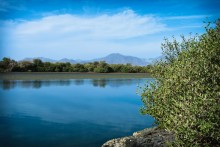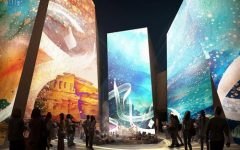 The Sharjah Investment and Development Authority (Shurooq) has begun implementing the Kalba Kingfisher Lodge, its latest ground-breaking eco-tourism project, in collaboration with the Sharjah Environment and Protected Areas Authority (EPAA). Shurooq said that the five-star hospitability project, featuring a tented camp that offers unique experiences within the mangrove nature reserve in the heart of Kalba’s natural beauty, is the perfect addition to its strategy of promoting environmentally friendly tourism.
The Sharjah Investment and Development Authority (Shurooq) has begun implementing the Kalba Kingfisher Lodge, its latest ground-breaking eco-tourism project, in collaboration with the Sharjah Environment and Protected Areas Authority (EPAA). Shurooq said that the five-star hospitability project, featuring a tented camp that offers unique experiences within the mangrove nature reserve in the heart of Kalba’s natural beauty, is the perfect addition to its strategy of promoting environmentally friendly tourism.
The Kingfisher Lodge, due to be completed by the end of the first half of 2017, will house 20 luxury tents. With a private swimming pool for each tent, the accommodation is designed to provide guests with comfort, privacy and amazing views overlooking the Indian Ocean and a forest of mangrove (Qurm) trees surrounding the lodge – also home to a number of kingfishers and a host of flora and fauna. With an ambience of luxury and convenience, the Kingfisher Lodge will include an outdoor yoga and wellness centre and a range of public facilities, including an information desk, a reception lounge, restaurants and outdoor recreational areas. The tented lodge is being constructed in compliance with the highest global standards of green and sustainable building in order to have minimal impact on the surrounding environment.
H.E. Marwan bin Jassim Al Sarkal, CEO, Shurooq, said: “There are so many parts of Sharjah which qualify as outstanding areas of natural beauty and we have identified that there are numerous hospitality opportunities which could cater to that market. We understand that there are a growing number of eco-tourists, and a shift in trends towards visitors who want to enjoy incredible natural surroundings in a luxury environment. The Kalba Kingfisher Lodge is an ideal fit for that market. He added: “Shurooq has a long-term commitment to the implementation of sustainable and eco-friendly projects as well as tourist and leisure destinations, most notably the Mleiha Archeological and Ecotourism project and Kalba Eco-Tourism Project.”
 Tourism Breaking News
Tourism Breaking News


